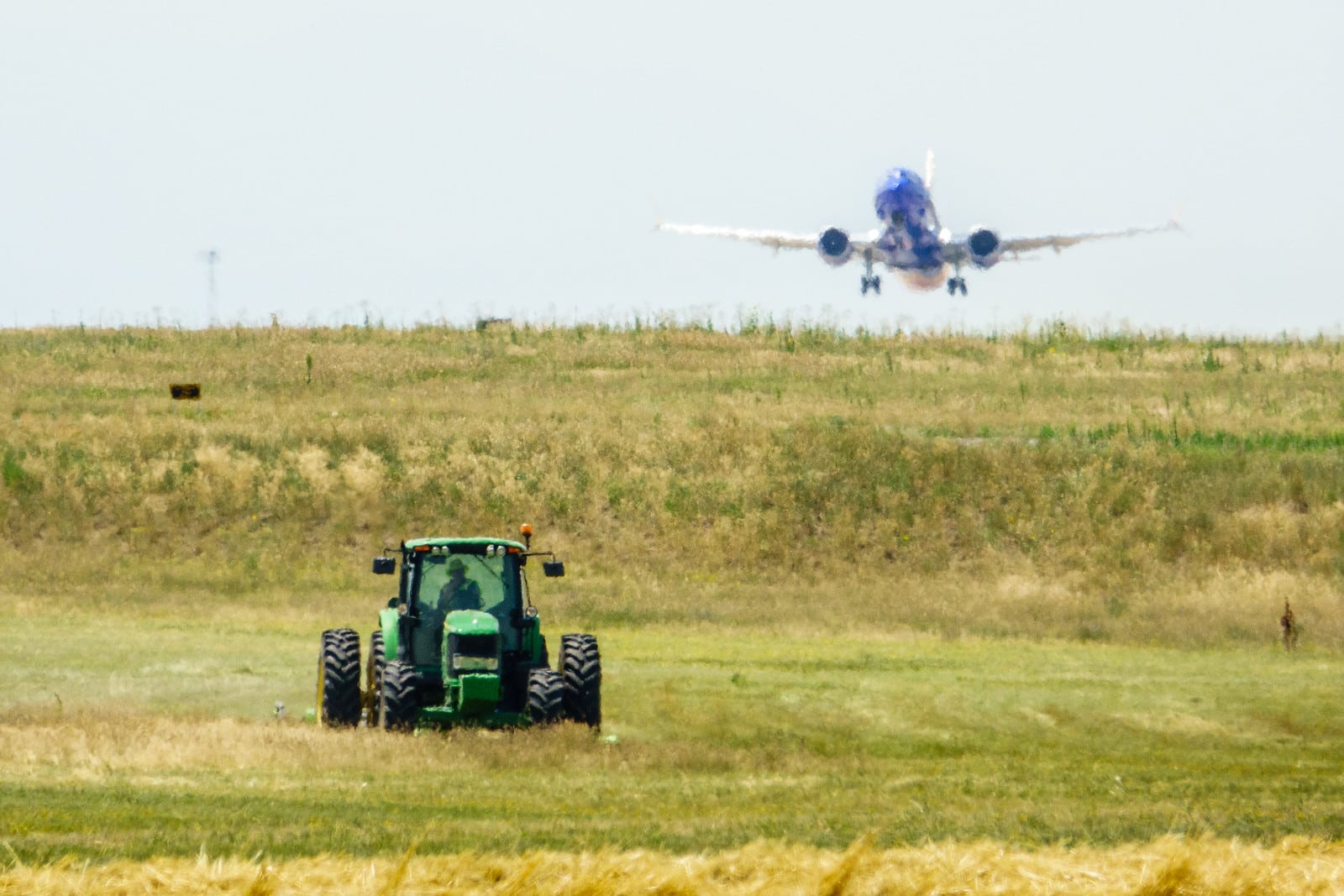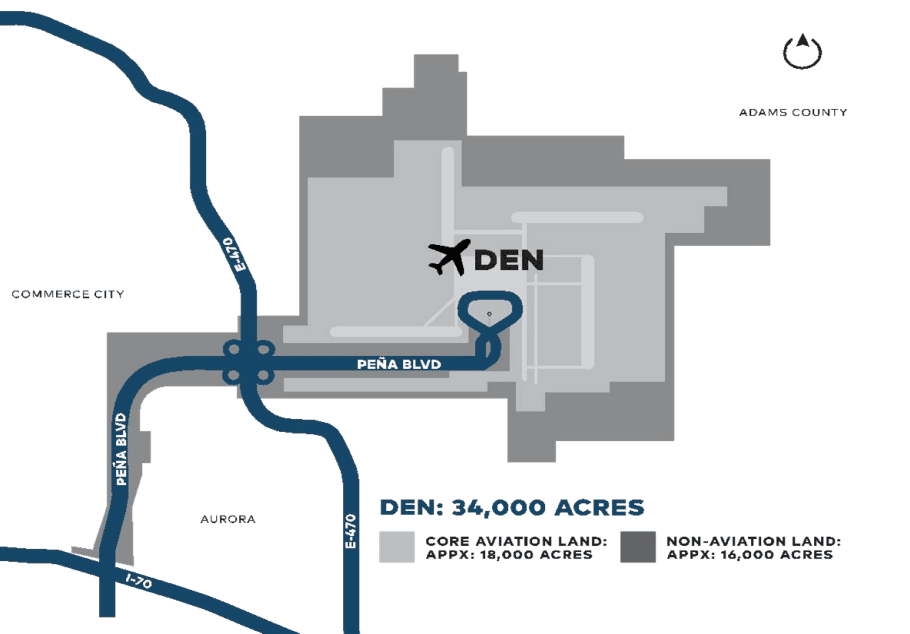
Denver International Airport staff mow grass on undeveloped land near the runways. (Courtesy Denver International Airport)
An appeals court ruled Thursday that the city can use vacant land near Denver International Airport for commercial development over the objections of a former landowner.
A three-judge panel of the Colorado Court of Appeals unanimously determined that Denver’s ownership of the land is absolute, so it can be used for non-DIA purposes. The ruling is a loss for the land’s previous owner, who said the land should be returned to it.
Before building DIA in the 1990s, the city acquired land through purchases and eminent domain, including 8,360 acres taken from a company called Monaghan Farms. In 1989, a three-week trial determined that Monaghan Farms was owed $38.5 million for its land.
Denver appealed that decision and the Colorado Supreme Court agreed to hear the case. But before it could, the two sides settled in 1992 and Denver paid $30.1 million. That settlement required Denver to use the land for airport purposes only, according to Monaghan.
DIA’s land holdings comprise approximately 34,000 acres, but only 18,000 of that is considered “core aviation land,” where terminals, runways and other facilities already sit or are slated to be added in the future. That leaves 16,000 acres of “non-aviation land,” which includes property on the outskirts of the runways as well as land on both sides of Pena Boulevard leading up to the airport.
The airport sometimes ground leases portions of the non-aviation land to developers who build things like gas stations and restaurants. Earlier this year, a Coca-Cola bottler planning to build a new plant struck a $270.75 million lease deal for 97 airport acres.
A victory by Monaghan Farms would have jeopardized that portion of the airport’s business model.
In 2017, as Denver moved ahead with plans to develop 1,500 acres of former Monaghan land, Monaghan’s lawyers threatened to sue if they did. In 2020, its lawyers renewed that threat, so Denver asked a judge to settle the dispute.
In April 2022, Denver District Court Judge Shelley Gilman sided with the city, finding that it fully owns the land under the 1992 agreement and can use it for non-DIA development. Monaghan appealed that decision to the Court of Appeals, which heard arguments last month.
The question before the court was whether Denver acquired the Monaghan land “in fee simple absolute.” If so, its ownership is unconditional. Monaghan Farms contended that the city did not pay full market price for the land and did not specifically say it was acquiring the land in fee simple absolute, so its ownership was conditional: it could only be used by DIA.
The Court of Appeals rejected that argument in its 20-page ruling Thursday.
“We’re pleased with the appellate division’s ruling. We think they understood the issues,” said Assistant City Attorney David Steinberger. “Hopefully this puts the matter to bed.”
Included in the former Monaghan parcels is 26 acres that Denver calls the “West Approach,” near the Final Approach retail center and cellphone lot at 7680 N. Wenatchee St. In February 2022, the city announced it was seeking proposals for hotels and retail there.
Monaghan Farms was represented by attorneys Christopher Taravella, Michael McCormick and James Taravella with the Greenwood Village law firm Montgomery Little & Soran, along with sole practitioner Robert Duncan. They did not respond to requests for comment.

Denver International Airport staff mow grass on undeveloped land near the runways. (Courtesy Denver International Airport)
An appeals court ruled Thursday that the city can use vacant land near Denver International Airport for commercial development over the objections of a former landowner.
A three-judge panel of the Colorado Court of Appeals unanimously determined that Denver’s ownership of the land is absolute, so it can be used for non-DIA purposes. The ruling is a loss for the land’s previous owner, who said the land should be returned to it.
Before building DIA in the 1990s, the city acquired land through purchases and eminent domain, including 8,360 acres taken from a company called Monaghan Farms. In 1989, a three-week trial determined that Monaghan Farms was owed $38.5 million for its land.
Denver appealed that decision and the Colorado Supreme Court agreed to hear the case. But before it could, the two sides settled in 1992 and Denver paid $30.1 million. That settlement required Denver to use the land for airport purposes only, according to Monaghan.
DIA’s land holdings comprise approximately 34,000 acres, but only 18,000 of that is considered “core aviation land,” where terminals, runways and other facilities already sit or are slated to be added in the future. That leaves 16,000 acres of “non-aviation land,” which includes property on the outskirts of the runways as well as land on both sides of Pena Boulevard leading up to the airport.
The airport sometimes ground leases portions of the non-aviation land to developers who build things like gas stations and restaurants. Earlier this year, a Coca-Cola bottler planning to build a new plant struck a $270.75 million lease deal for 97 airport acres.
A victory by Monaghan Farms would have jeopardized that portion of the airport’s business model.
In 2017, as Denver moved ahead with plans to develop 1,500 acres of former Monaghan land, Monaghan’s lawyers threatened to sue if they did. In 2020, its lawyers renewed that threat, so Denver asked a judge to settle the dispute.
In April 2022, Denver District Court Judge Shelley Gilman sided with the city, finding that it fully owns the land under the 1992 agreement and can use it for non-DIA development. Monaghan appealed that decision to the Court of Appeals, which heard arguments last month.
The question before the court was whether Denver acquired the Monaghan land “in fee simple absolute.” If so, its ownership is unconditional. Monaghan Farms contended that the city did not pay full market price for the land and did not specifically say it was acquiring the land in fee simple absolute, so its ownership was conditional: it could only be used by DIA.
The Court of Appeals rejected that argument in its 20-page ruling Thursday.
“We’re pleased with the appellate division’s ruling. We think they understood the issues,” said Assistant City Attorney David Steinberger. “Hopefully this puts the matter to bed.”
Included in the former Monaghan parcels is 26 acres that Denver calls the “West Approach,” near the Final Approach retail center and cellphone lot at 7680 N. Wenatchee St. In February 2022, the city announced it was seeking proposals for hotels and retail there.
Monaghan Farms was represented by attorneys Christopher Taravella, Michael McCormick and James Taravella with the Greenwood Village law firm Montgomery Little & Soran, along with sole practitioner Robert Duncan. They did not respond to requests for comment.

